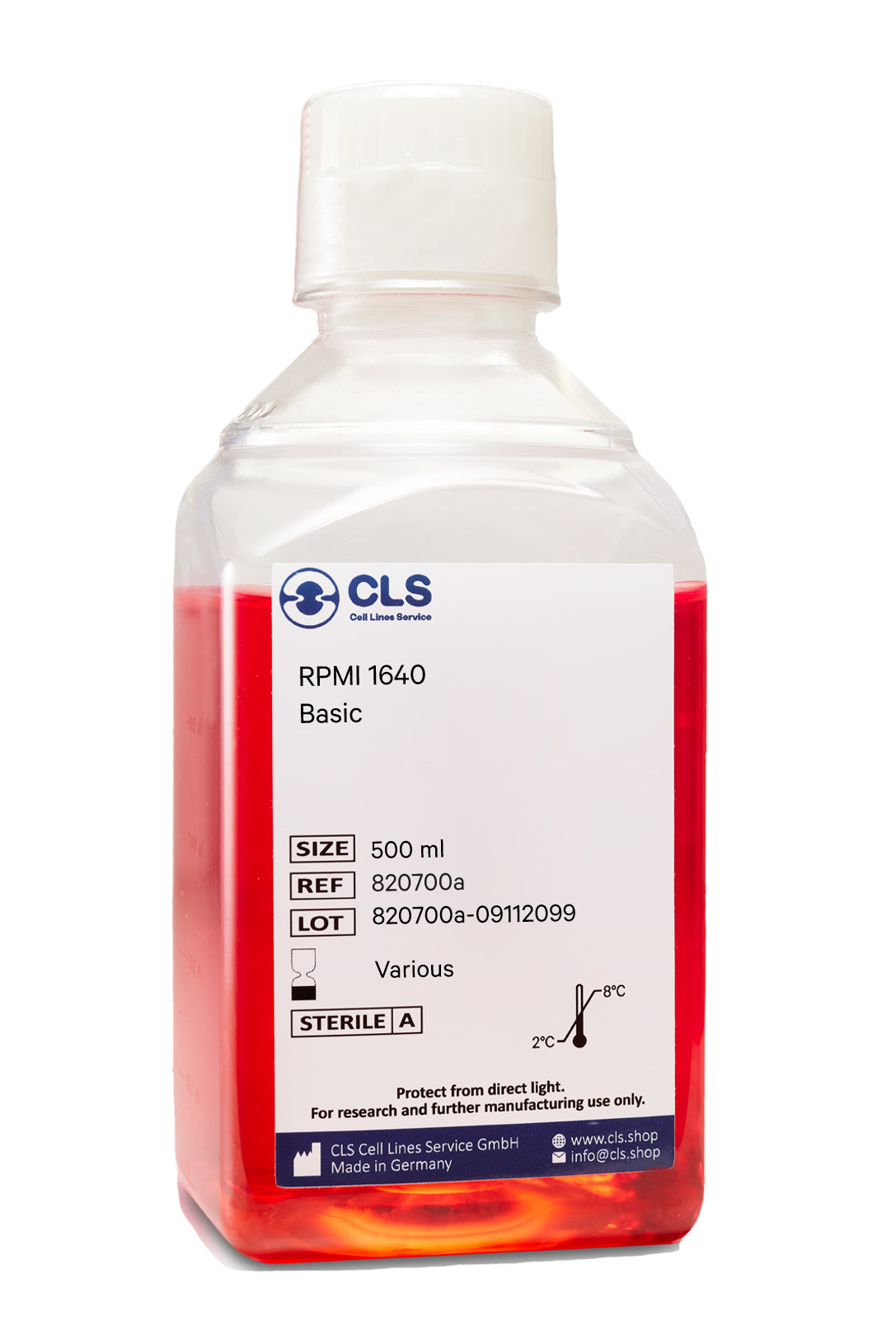RPMI 1640, w: 4.5 g/L Glucose, w: 2 mM L-Glutamine, w: 10 mM HEPES, w: 1 mM Sodium pyruvate, w: 1.5 g/L NaHCO3
RPMI 1640 Medium, also known as RPMI medium, is a highly versatile cell culture medium widely utilized in biological research to cultivate various mammalian cells. Developed by George E. Moore, Robert E. Gerner, and H. Addison Franklin in 1966 at the renowned Roswell Park Comprehensive Cancer Center, this medium derived its name from its origin at the Roswell Park Memorial Institute (RPMI).
Initially designed to support the growth of human leukemic cells in both suspension and monolayer cultures, RPMI 1640 Medium has evolved through modifications by researchers and commercial suppliers to become suitable for a diverse range of mammalian cells. It is exceptionally compatible with cell lines such as HeLa, Jurkat, MCF-7, PC12, PBMC, astrocytes, and carcinomas.
RPMI 1640 Medium stands apart from other cell culture media due to its unique composition. It contains a substantial amount of phosphate, amino acids, and vitamins. Notably, it encompasses biotin, vitamin B12, and PABA, absent in Eagle's Minimal Essential Medium or Dulbecco's Modified Eagle Medium. Moreover, RPMI 1640 Medium exhibits significantly elevated concentrations of vitamins inositol and choline. However, it does not contain proteins, lipids, or growth factors. Consequently, supplementation with 10% Fetal Bovine Serum (FBS) is commonly required to provide optimal conditions for cell growth.
The buffering system of RPMI 1640 Medium relies on sodium bicarbonate (2.0 g/L) and necessitates a 5-10% CO2 environment to maintain a physiologically appropriate pH. The inclusion of the reducing agent glutathione further distinguishes this medium from others.
This RPMI 1640 medium contains 4.5 grams per liter of glucose.
Quality control
- pH = 7.2 +/- 0.02 at 20-25°C.
- Each lot has been tested for sterility and absence of mycoplasma and bacteria.
Maintenance
- Keep refrigerated at +2°C to +8°C in the dark. Freezing and warming up to +37° C minimize the quality of the product.
- Do not heat the medium to more than 37° C or use uncontrollable sources of heat (e.g., microwave appliances).
- If only a part of the medium is to be used, remove this amount from the bottle and warm it up at room temperature.
- Shelf life for any medium except for the basic medium is 8 weeks from the date of manufacture.
Composition
| Components | mg/L | |
| Inorganic Salts | Calcium nitrate x 4H2O | 100,00 |
| Magnesium sulfate anhydrous | 48,83 | |
| Potassium chloride | 400,00 | |
| Sodium chloride | 5450,00 | |
| di-Sodium hydrogen phosphate | 800,49 | |
| Other Components | D(+)-Glucose anhydrous | 4500,00 |
| Glutathione (red.) | 1,00 | |
| HEPES | 2383,00 | |
| Phenol red | 5,00 | |
| Sodium pyruvate | 110,00 | |
| Amino Acids | L-Arginine x HCl | 241,86 |
| L-Asparagine x H2O | 56,82 | |
| L-Aspartic acid | 20,00 | |
| L-Cystine x 2HCl | 65,19 | |
| L-Glutamine | 300,00 | |
| L-Glutamic acid | 20,00 | |
| Glycine | 10,00 | |
| L-Histidine x HCl x H2O | 20,27 | |
| L-Hydroxyproline | 20,00 | |
| L-Isoleucine | 50,00 | |
| L-Leucine | 50,00 | |
| L-Lysine x HCl | 40,00 | |
| L-Methionine | 15,00 | |
| L-Phenylalanine | 15,00 | |
| L-Proline | 20,00 | |
| L-Serine | 30,00 | |
| L-Threonine | 20,00 | |
| L-Tryptophan | 5,00 | |
| L-Tyrosine x 2Na | 28,83 | |
| L-Valine | 20,00 | |
| Vitamins | p-Aminobenzoic acid | 1,00 |
| D-(+)-Biotin | 0,20 | |
| D-Calcium pantothenate | 0,25 | |
| Choline chloride | 3,00 | |
| Folic acid | 1,00 | |
| myo-Inositol | 35,00 | |
| Nicotinamide | 1,00 | |
| Pyridoxine x HCl | 1,00 | |
| Riboflavin | 0,20 | |
| Thiamine x HCl | 1,00 | |
| Vitamin B12 | 0,01 | |
| NaHCO3 | 1500,00 |

